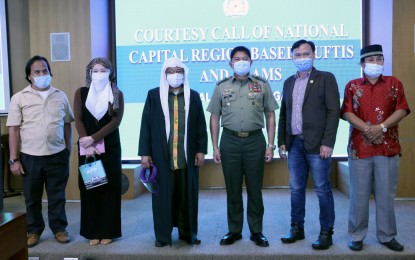
MEETING WITH MUSLIM LEADERS. AFP chief-of-staff Gen. Gilbert Gapay (3rd from right) poses for a photo opportunity with muftis, imams, and madrasah (Islamic schools) officials in a meeting in Camp Aguinaldo, Quezon City on Monday (Oct. 26, 2020). The meeting is part of the AFP's partnerships with imams and Muslim organizations in preventing and countering violent extremism and programs that give emphasis on stakeholder engagements and local government participation. (Photo courtesy of AFP Public Affairs Office)
MANILA – Armed Forces of the Philippines (AFP) chief-of-staff Gen. Gilbert Gapay on Monday met with National Capital Region-based muftis, imams, and madrasah (Islamic schools) officials as part of efforts to foster closer ties with Muslim communities.
"I would like to express my sincerest gratitude to the Muftis and Imams based in NCR for gracing us with their presence on this great opportunity for an extensive dialogue between our organizations in order to fortify our efforts in fighting against lawless elements that threaten our fellow Filipinos," Gapay told the Muslim leaders in their meeting at AFP General Headquarters in Camp Aguinaldo, Quezon City.
These Muslim dignitaries were NCR Grand Mufti Dr. Al-Sheick Abdeljabar M. Macarimbor of the Filipino-Arab Alliance and united Muslim Ummah Federation for Socio-Economic and Peace Development; Grand Imam Alem Maguid A. Tahir; Aleem Ahmad Kudarat; Aleem Abubacar Talib Manamping; Datu Umbria P. Mama; Aleem Hanip Sarip; Aleem Aliasgar Abolais; Mohammad Alioden Manalinding; Aleem Nashroden Alamada; Alihasan Taha; Aleem Khalid H. Matling; Aleem Abdulhamid Mustapha; Hismam H. Sedic; Abdul Malik Calauto; Almanzor I. Hajishaq; Abobacar T. Manampen; Sherwina Ali; Secretary to the NCR Grand Mufti Alex Y. Lebria; Bai Rohaniza Sumndad-Usman.
“There is a need for better collaboration between our groups and the AFP. We are happy that this meeting is a promising start to have a more lasting partnership with the AFP to further improve our Madaris and sustain this as a pillar and institution of peace. Everything happens for a reason and that this may be Allah’s way for the government to further look into and act on the many challenges of the Madaris throughout the country,” Al-Sheick Macarimbor said.
Also present in the meeting were members and representatives of the Joint, Personal, and Special Staff as well as officers from the AFP Wide Service Support Units.
Gapay initially requested a meeting with the Islamic dignitaries at their convenience. However, the leaders expressed their willingness to pay him a courtesy call instead.
The meeting also served as a venue for Gapay to reiterate the AFP’s position in protecting the madaris from terrorist exploitation. Madrasah (madaris in plural) refers to an educational institution that teaches Islamic studies and Arabic literacy.
Gapay said it was an honor and privilege to be accorded the opportunity to gain knowledge and insights from highly educated scholars and experts.
He praised them for their expertise in multiple facets of peace and socio-economic development and wide knowledge of the true essence of Islam which can be utilized to craft comprehensive and eclectic methods of military operations.
Gapay said the dialogue was just an initial meeting and that there will be sustained and future interaction that will involve other stakeholders from both the government and other institutions in strengthening partnership with the madaris.
The AFP has ongoing partnerships with imams and Muslim organizations in preventing and countering violent extremism (PCVE), and programs that give emphasis on stakeholder engagements and local government participation.
PCVE activities contribute to protecting vulnerable communities and facilities such as primary and secondary schools, colleges and universities, madrassah, and torils/orphanages.
Programs such as the National Youth Leadership Summit and the National Indigenous Peoples’ Leaders Summit are regularly conducted to strengthen the youth and IP sectors and protect them from radicalization and extremist recruitment.
“As mandated defenders of the peace and security of our land, we in the AFP remain staunch in intensifying our peace and security operations to slowly but surely reach our goal of uprooting the source of manpower, firepower, and finances of these local terrorist groups that have been disrupting the peaceful living of our citizens,” Gapay said. (PNA)
